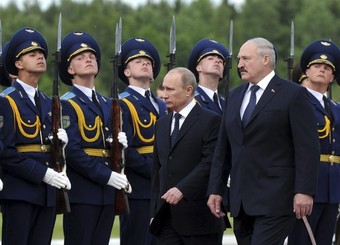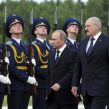
Putin Visits Belarus
Publication: Eurasia Daily Monitor Volume: 9 Issue: 103
By:

Today (May 31), Russia’s President Vladimir Putin made the first foreign trip of his new term in office. The visit was to neighboring Belarus to hold talks with his Belarusian counterpart, Alyaksandr Lukashenka, in Minsk. Putin’s choice of Belarus was something of a surprise as there was “competition” from Kazakhstan to be his first point of call. The visit symbolizes Russia’s new foreign policy priorities toward Eurasia. But where does this frequently difficult relationship between two close neighbors stand currently, and what lies ahead?
According to Chairman of the Belarusian Council of Ministers Mikhail Myasnikovich, the Moscow-Minsk relationship is now at its best. The two sides have overcome their various problems, there is “political understanding on all issues,” and the trade turnover is rapidly increasing. His remarks followed a succession of three high-level bilateral visits between the two countries: meetings between Lukashenka and three Russian governors, a Belarusian delegation’s visit to Kemerovo headed by Lukashenka’s son Dmitry, and the arrival in Minsk of Grigorii Rapota, Secretary of the Union State of Russia and Belarus (Telegraf.by, May 30). Lukashenka’s only clear signal of the possible content of the presidential talks was his comment on expanding the Belarusian Potash Company, the trading branch of the Urals Potash Company (Uralkali), which operates a joint venture with the Belarusian government (SB-Belarus’ Segodnya, May 30).
The Belarusian Institute for Strategic Studies (BISS) recently offered new analysis of Belarus’ relations with Russia. It noted that the when the principles of the Common Economic Space (CES) were first established, they led to an immediate dispute over air flights between Minsk and Moscow that lasted from March 26 to April 9, and ended in a total defeat for the goals of the Belarusians: to establish special economic terms that would not comply with the CES framework (BISS Foreign Policy Index, March-April 2012, p. 4). The issue highlights the fundamental question: i.e. whether Belarus can find room to maneuver within the integration process, and specifically whether it can maintain its peculiar state-run economic policies in defiance of the tendencies in its partner states and the rules by which the CES operates.
For the Belarusian leadership, a return to a Putin presidency is preferable to working with Medvedev. Clearly it hopes for more concessions with a relaxing of conditions for future loans, such as those tied to the $3 billion Eurasian Economic Union (EuEU) loan (mainly through Russian funds) last year, which entailed the privatization of $7.5 billion of state assets over three years and the loss of its valuable gas pipeline to Russia. Lukashenka recognizes that Putin has placed great emphasis on integration with neighbors and that Belarus is the most reliable choice to do this – a small country without major resources that is highly dependent on Russian support. Thus he has a modicum of leeway and can delay privatization of Belarus’ most lucrative companies like Belaruskali or the MAZ trucking company. BISS’s analysis suggests that despite Lukashenka’s careful maneuvers, “His stratagems are not of major importance to Russia” (BISS Foreign Policy Index, March-April 2012, p. 5). In other words, Russia’s position vis-à-vis Belarus is so powerful that the Belarusian president is merely forestalling the inevitable, which is deeper integration on terms determined by Russia.
The argument is convincing, mainly because, to date, the Belarusian side has no clear alternatives to working with Putin. The country is constantly in need of external financing to cover loans previously received from Russia, the IMF and elsewhere. Relations with China have made progress but, thus far, the outcome has been mainly a series of scientific and technological projects (https://www.belaruschina.by/ru/). Relations with the EU have the potential to improve, but possibly not in the short term and not while EU sanctions remain in place. Belarus’s current and potential partners have serious economic (in the case of the EU) and political (in the case of Russia) problems of their own. Yet, assuming the Putin presidency runs its full term, the traditional policy of the Lukashenka regime to muddle through may serve to keep the Belarusian president in office. Such an outcome is likely if Lukashenka’s government still clings to certain state companies while abandoning others, continues to cooperate within the CES, and refuses to recognize the Georgian breakaway regions as independent; but such policy tactics may also ensure that Belarus’s independence is gradually dismantled.
Vladimir Putin’s precise regional goals are typically nebulous. Making Eurasia a priority covers a great variety of spheres from the most obvious one of deepening integration through bilateral relations, to the Collective Security Treaty Organization (CSTO), the EuEU, the CES, the Commonwealth of Independent States (CIS), and the recognition of the breakaway Georgian republics of South Ossetia and Abkhazia. Belarus features in each of these but has been reluctant to recognize the independence of the two latter regions because of its friendship with Georgia, particularly that between the respective leaders, Lukashenka and Mikheil Saakashvili. Yet, analyst Sergey Markedonov has gone so far as to assert that the old CIS is less significant for Russia than the newly elaborated aims of the EuEU (The National Interest, May 29).
In fact, the CIS now seems obsolete, and the Russia-Belarus Union in both its earlier and current forms has achieved little in its sixteen years of existence. The key focus is on the EuEU, which Russia now proposes to expand to form a Eurasian Inter-Parliamentary Assembly – the first stage of a process that would eventually result in a fully formed Eurasian Union. That Belarus intends to participate through its largely dysfunctional parliament seems evident from Lukashenka’s remark that the Belarusian Ministry of Affairs should prepare for “milestone events” in foreign policy that would focus mainly on cooperation with Russia (Telegraf.by, May 29).
But as Putin no doubt realizes, there is little reason to hasten events. His new Eurasian policy, as Markedonov notes, is based less on nostalgia for the old USSR than on matters of common interest to the Eurasian states. Belarus has fewer internal problems than most of the other potential Russian partners, but its debts to Russia continue to mount with each year. The process of deeper integration that Lukashenka helped initiate during his first term in office is now bearing fruit. Increasingly, the Belarusian economic model looks out of step with that of its new Eurasian partners, yet they will continue to work together despite periodic disputes. Neither side has much alternative, particularly when the goal of the individual leaders, all of whom can be to some degree termed “authoritarian,” is to remain in power. Between them, the presidencies of the three leaders of the CES [Vladimir Putin, Nursultan Nazarbayev and Alyaksandr Lukashenka] have already lasted a total of 47 years, proof that this at least is something in which they excel.




